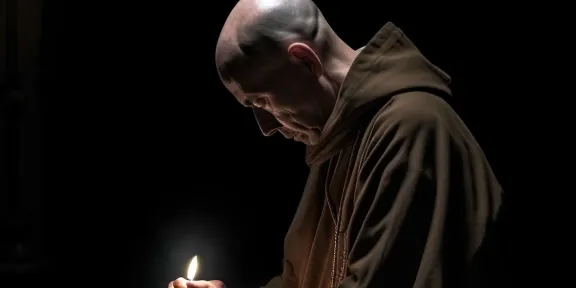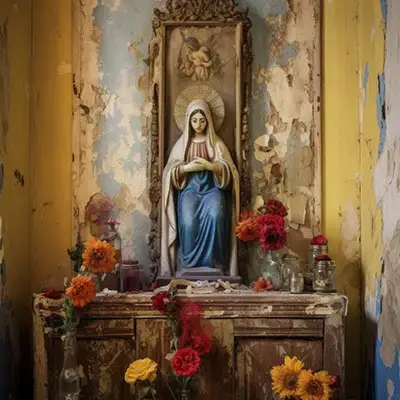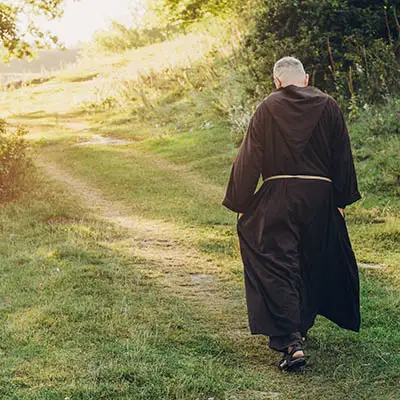
Thomas Merton
“Every moment and every event of every man's life on earth plants something in his soul.”
Thomas Merton Facts
- Thomas Merton was an American Trappist monk, writer, theologian, mystic, poet, social activist, and scholar of comparative religion.
- He was born on January 31, 1915 in Prades, France and died on December 10, 1968 in Bangkok, Thailand.
- Merton was baptized in the Anglican Church but converted to Catholicism as a young man.
- He entered the Abbey of Gethsemani, a Trappist monastery in Kentucky, in 1941.
- Merton wrote over 70 books on spirituality, social justice, and peace.
- His best-known work is his autobiography, The Seven Storey Mountain, which was published in 1948.
- Merton was a pioneer in interfaith dialogue, engaging with Eastern religions such as Buddhism and Taoism.
- He corresponded with prominent figures such as Mahatma Gandhi, Thich Nhat Hanh, and Martin Luther King Jr.
- Merton was also a strong advocate for nonviolence and participated in civil rights and anti-war demonstrations.
- He was a proponent of contemplative prayer and meditation as a means to achieve spiritual growth.
- Merton was a gifted poet and his poems often reflected his deep spiritual insights.
- He was a prolific writer, producing essays, journals, letters, and translations in addition to his books.
- Merton was a keen environmentalist and wrote about the need for humanity to live in harmony with nature.
- His writings on peace and social justice continue to inspire activists and advocates for a better world.
- Merton's spiritual journey led him to explore the depths of his own faith and to seek unity with all of humanity.
- He was known for his humility and simplicity, despite his status as a renowned intellectual and writer.
- Merton's work continues to be studied and celebrated by scholars, theologians, and spiritual seekers around the world.
- He was a mentor and spiritual guide to many, both within and outside of the Catholic Church.
- Merton's legacy lives on through the Thomas Merton Center at Bellarmine University, which promotes his teachings and writings.
- Merton's influence extends beyond the Catholic Church to include people of all faiths and backgrounds who are drawn to his message of love, peace, and compassion.
- Thomas Merton was born on January 31, 1915 in Prades, France.
- Thomas Merton was an American Trappist monk, writer, theologian, mystic, artist, and social activist.
- Merton entered the Abbey of Gethsemani in rural Kentucky in 1941, where he lived as a cloistered monk until his death in 1968.
- Merton's most famous work, The Seven Storey Mountain, was published in 1948 and tells the story of his conversion to Catholicism and his decision to enter the monastery.
- Merton was a prolific writer and author of more than 70 books on a wide range of topics including spirituality, social justice, and interfaith dialogue.
- Merton was known for his dedication to contemplative prayer and his belief in the importance of both solitude and community in the spiritual life.
- Merton was a strong advocate for social justice and civil rights, and he corresponded with and supported figures like Martin Luther King Jr. and Dorothy Day.
- Merton was also interested in Eastern religions and engaged in dialogue with Buddhist and Hindu practitioners, leading to a deep appreciation for the contemplative traditions of the East.
- Merton was a talented photographer and artist, and his artwork often reflected his spiritual insights and experiences.
- Merton was a pioneer in the field of interfaith dialogue, and his writings on the commonalities between different religious traditions continue to inspire people of all faiths today.
- Merton was a proponent of nonviolence and spoke out against war and nuclear weapons during the Vietnam War era.
- Merton was a hermit for a period of time in the early 1960s, living in a small hermitage on the grounds of the monastery where he could devote himself to prayer and contemplation.
- Merton corresponded with many influential figures of his time, including the Dalai Lama, Thich Nhat Hanh, and the theologian Karl Barth.
- Merton was deeply interested in the relationship between spirituality and the arts, and he believed that art could be a powerful vehicle for expressing one's innermost experiences of the divine.
- Merton was a keen observer of nature and often wrote about the beauty and mystery of the natural world as a reflection of the divine presence.
- Merton struggled with the tension between the demands of his monastic vocation and his desire for solitude and contemplation, as well as his interest in engagement with the world.
- Merton was a proponent of what he called contemplative activism, which he saw as a way of addressing social injustice and working for peace from a place of deep spiritual grounding.
- Merton traveled extensively throughout his life, visiting countries like England, France, Italy, and Sri Lanka, and his experiences in different cultures influenced his understanding of the global dimensions of spirituality.
- Merton was a complex and multifaceted figure who continues to inspire people of all backgrounds with his profound insights into the spiritual life and his passionate commitment to social justice.
- Merton died on December 10, 1968 while on a trip to Thailand, and his legacy lives on through his writings, artwork, and ongoing influence on spiritual seekers around the world.
- Thomas Merton was born on January 31, 1915, in Prades, France.
- His original name was Thomas Merton, but he later entered the Trappist monastic order and became known as Father M. Louis.
- Merton was an American Trappist monk, writer, theologian, mystic, and poet.
- He is best known for his autobiography, The Seven Storey Mountain, which was published in 1948 and became a bestseller.
- Merton entered the Abbey of Gethsemani in Kentucky in 1941 and lived there until his death in 1968.
- He was a prolific writer and published over 70 books on spirituality, social justice, and interfaith dialogue.
- Merton was a proponent of contemplative prayer and meditation and believed in the importance of silence and solitude in spiritual growth.
- He was deeply influenced by Eastern religions, particularly Zen Buddhism, and corresponded with prominent figures such as the Dalai Lama and D.T. Suzuki.
- Merton was also a vocal advocate for social justice and civil rights, speaking out against racism, poverty, and the Vietnam War.
- He was a friend and mentor to many prominent figures in the Catholic Church, including Dorothy Day and Daniel Berrigan.
- Merton was a strong supporter of ecumenism and believed in the importance of dialogue between different religious traditions.
- He was a talented photographer and took many striking black-and-white photographs during his time at the monastery.
- Merton was a pioneer in the field of interfaith dialogue and wrote extensively on the similarities between Christianity and Eastern spirituality.
- He was a strong advocate for nonviolence and pacifism and believed in the power of contemplation to bring about social change.
- Merton was deeply interested in the natural world and wrote movingly about the beauty of the Kentucky countryside where he lived.
- He corresponded with many leading intellectuals and writers of his time, including T.S. Eliot and Aldous Huxley.
- Merton's writing has been translated into numerous languages and continues to be read and studied around the world.
- He died on December 10, 1968, in Bangkok, Thailand, while attending a conference on East-West monastic dialogue.
- Merton's legacy continues to inspire people of all faiths and backgrounds to seek deeper spiritual meaning and connection in their lives.
- His writings on solitude, contemplation, and the search for meaning in a complex and materialistic world remain as relevant today as they were during his lifetime.

